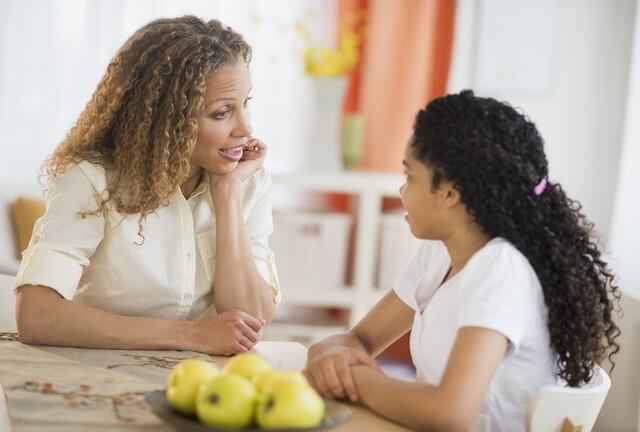Parent/Child Communication – Even More Crucial After Divorce!
 By Rosalind Sedacca, CDC
By Rosalind Sedacca, CDC
It’s no secret that one of the biggest challenges a parent faces after divorce is staying in good communication with your children. Obviously all parents struggle with communication issues as their children grow, but children who have had their lives dramatically altered by separation or divorce need even more attention – and diligent observation by their parents.
Children tend not to tell you when they are angry, resentful, confused, hurt or depressed. Instead they reflect their problems through their behavior – acting out or perhaps turning inward in ways that you have not experienced prior to the divorce.
Here are some tips that most all professionals agree about as ways to encourage positive and productive communication between you and your children. Many of these are obvious or innate behaviors. However, others can easily be forgotten amid the challenges you are juggling in your own life on a daily basis.
Take time to see the world through your children’s eyes and you will be better able to meet their needs, understand their confusion or aggression and find appropriate ways to resolve tension and heal hurts through your conversation and caring behaviors.
· Be available and attentive when your child comes to you to talk or ask questions. That means turning off the TV, putting down the tablet, not answering the phone and giving them eye-contact and a welcoming smile. Sometimes attempting to talk to you is the result of considerable thought and risk on their part. Encourage these conversations when they happen.
· It is helpful to sit, kneel or in other ways get down closer to your child’s level when you talk. Towering over them is a form of intimidation that does not translate into safety or trust.
· Keep your conversations private unless they want to include others. Let them know they are safe in confiding to you and that you are interested and care about matters that concern them.
· Don’t dismiss a subject lightly if it is one bothering your child. Laughing, joking or teasing will create alienation that ultimately will discourage your child to share what is bothering them with you. This is a dangerous road to travel, especially as your children develop into their teen years.
· Equally important is to never embarrass your children or put them on the spot in front of others. This will immediately close the door to honest, trustworthy communication.
· Avoid talking to your child when you are angry or upset with them or others. Promise to talk in a half-hour or hour at a specific place after you’ve had a chance to settle down and regain your objectivity.
· Be an active listener. Don’t interrupt while your child is talking. Listen carefully and then paraphrase back what you heard them say. Ask if you’re right in your interpretation. They’ll tell you. This give and take will help you more precisely understand what is really at issue.
· Asking why can be intimidating and close off your conversation. Instead ask what happenedquestions, which keep the dialogue open.
· Be patient. Don’t react or respond until you get the full message. Sometimes it takes some meandering for your child to reach the crucial point of what they want to say. Don’t shut them off too soon!
· Remember that lecturing, preaching, moralizing or “parenting” comments can put up barriers to clear communication. Listening is your most valuable skill and tool.
· Catch your judgments and put-downs, even when confronted with upsetting information. Don’t belittle your children, call them names or insult their behaviors. Talk tothem – not at them! The difference is felt as respect.
· Acknowledge your children for coming to you. Praise their braveness. If you were at fault, apologize honestly and discuss how you can make changes for the future.
· Show that you accept and love them – even if their behaviors were not acceptable. Then help them come up with some acceptable solutions they can understand and feel good about.
Children who feel safe talking to their parents grow up as better communicators overall. They will be more likely to have healthy communication in their own adult relationships – with their spouses and children.
Families that keep feelings repressed, that don’t discuss issues that come up, send the message that it’s not all right to talk about things that bother us. The consequences of this can be seen in our nightly news headlines every day.
You can open the doors to caring communication in your home by beginning today. Your children may be a little resistant at first as they test the waters, but they will surely appreciate this opportunity once they know you are sincere. Start the process yourself – and see how valuable it is to “hear” what your children have to say!
* * *
Rosalind Sedacca, CDC is the founder of the Child-Centered Divorce Network, a Divorce & Co-Parenting Coach and author of numerous books and e-courses on divorcing with children and co-parenting successfully. For instant download of her FREE EBOOK on Doing Co-Parenting Right: Success Strategies For Avoiding Painful Mistakes! go to: childcentereddivorce.com/book
Please share this article on social media!
© Rosalind Sedacca All rights reserved.
 I received the following question which poses many challenges related to divorce and parenting. While there is never a one-size-fits-all answer to relationship questions, I’m sharing my response with you as a perspective worth considering. This may be useful to initiate conversations with your former spouse and children or for discussion with a therapist or divorce coach if you are seeing one.
I received the following question which poses many challenges related to divorce and parenting. While there is never a one-size-fits-all answer to relationship questions, I’m sharing my response with you as a perspective worth considering. This may be useful to initiate conversations with your former spouse and children or for discussion with a therapist or divorce coach if you are seeing one.